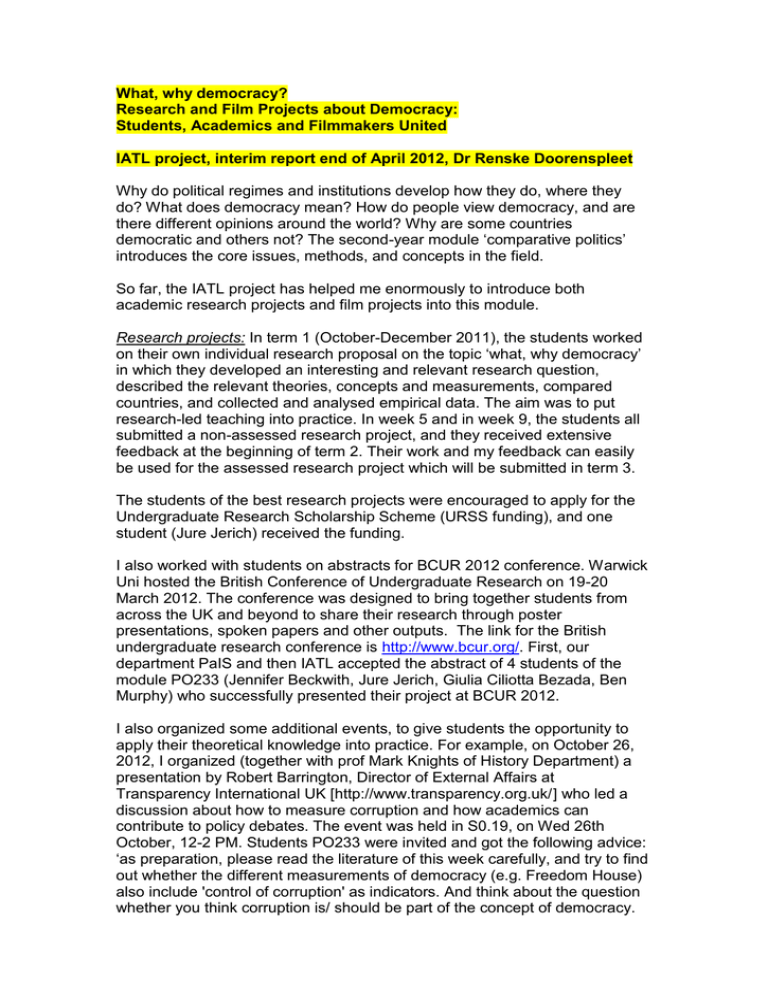What, why democracy? Research and Film Projects about Democracy:
advertisement

What, why democracy? Research and Film Projects about Democracy: Students, Academics and Filmmakers United IATL project, interim report end of April 2012, Dr Renske Doorenspleet Why do political regimes and institutions develop how they do, where they do? What does democracy mean? How do people view democracy, and are there different opinions around the world? Why are some countries democratic and others not? The second-year module ‘comparative politics’ introduces the core issues, methods, and concepts in the field. So far, the IATL project has helped me enormously to introduce both academic research projects and film projects into this module. Research projects: In term 1 (October-December 2011), the students worked on their own individual research proposal on the topic ‘what, why democracy’ in which they developed an interesting and relevant research question, described the relevant theories, concepts and measurements, compared countries, and collected and analysed empirical data. The aim was to put research-led teaching into practice. In week 5 and in week 9, the students all submitted a non-assessed research project, and they received extensive feedback at the beginning of term 2. Their work and my feedback can easily be used for the assessed research project which will be submitted in term 3. The students of the best research projects were encouraged to apply for the Undergraduate Research Scholarship Scheme (URSS funding), and one student (Jure Jerich) received the funding. I also worked with students on abstracts for BCUR 2012 conference. Warwick Uni hosted the British Conference of Undergraduate Research on 19-20 March 2012. The conference was designed to bring together students from across the UK and beyond to share their research through poster presentations, spoken papers and other outputs. The link for the British undergraduate research conference is http://www.bcur.org/. First, our department PaIS and then IATL accepted the abstract of 4 students of the module PO233 (Jennifer Beckwith, Jure Jerich, Giulia Ciliotta Bezada, Ben Murphy) who successfully presented their project at BCUR 2012. I also organized some additional events, to give students the opportunity to apply their theoretical knowledge into practice. For example, on October 26, 2012, I organized (together with prof Mark Knights of History Department) a presentation by Robert Barrington, Director of External Affairs at Transparency International UK [http://www.transparency.org.uk/] who led a discussion about how to measure corruption and how academics can contribute to policy debates. The event was held in S0.19, on Wed 26th October, 12-2 PM. Students PO233 were invited and got the following advice: ‘as preparation, please read the literature of this week carefully, and try to find out whether the different measurements of democracy (e.g. Freedom House) also include 'control of corruption' as indicators. And think about the question whether you think corruption is/ should be part of the concept of democracy. Is democracy possible with a high level of corruption, etc?’ Five students actively participated during this (voluntary) event. Film projects: In term 2 (January – March 2012), students got the opportunity to develop other skills, such as film making and working together in small groups. Students made their own film (of around 3 minutes) on the topic ‘what, why democracy’ – hence using their acquired academic, theoretical and empirical knowledge from this module. The aims were to develop new skills for students, build a link between academics and film makers, use interdisciplinary approaches, and to engage with global events and culture. Workshops on story telling were organized in term 1, and on film making in term 2, together with the very helpful Robert O’Toole. ‘What Why Democracy Festival’, for all students and staff Warwick): During term 1 and term 2, I worked hard on the preparations for the What Why Democracy Festival’ which will take place at the beginning of term 3 (May 2012). At this festival, students will get the opportunity to present both their academic research projects and their films on ‘what, why democracy?’ A talented film maker will be invited to present her own films related to democracy and other topics in the field of comparative politics, and she will watch and comment the work of the students of this module. The aims of such an event would be to put our theoretical knowledge into practice, and to build a bridge between academics and film makers working on the same topics in comparative politics. The best films will be posted on the CSD website in the summer of 2012. Change module outline: During term 1 and 2, I put around 25 hours in changing the module outline PO233 in order to include elements of research projects and film projects, and planning how to build internet site on this project, and working on changing the assessment methods. Milestones and Targets throughout the duration of the project (until end of April 2012) it went all well, see below Research projects: 1. week 9, term 1: submission by students, of individual research proposal on democracy in comparative perspective 2. week 19 and 20, term 2: presentation by students of the preliminary outcomes of the research projects Film projects: 1. term 1: guest lecture on film making and story telling, 2. week 17 and 18: students made their own films on this topic ‘what, why democracy’ in the Media Suite (G83, Millburn House) with the help of Robert O’Toole Student feedback: Students were involved in the process of the re-design of the module, by giving feedback during one session, and by written feedback-forms about the module itself (twice: in week 8 and week 10, term 2) Dr. Renske Doorenspleet is Associate Professor in Comparative Politics, at the department of Politics and International Studies, and Director of the Centre for Studies in Democratization, see http://www2.warwick.ac.uk/fac/soc/pais/research/csd/ Her research and teaching focuses on comparative politics, democracy and democratization around the world, quantitative and qualitative methodology, and politics in Africa. See for more information: http://www2.warwick.ac.uk/fac/soc/pais/staff/doorenspleet/ See for more information IATL project: http://www2.warwick.ac.uk/fac/cross_fac/iatl/projects/fellowships/ and see also http://www2.warwick.ac.uk/fac/soc/pais/research/csd/




